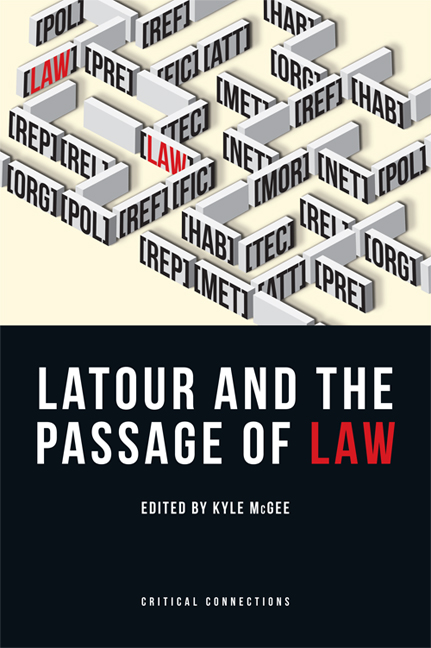Book contents
- Frontmatter
- Contents
- Introduction
- 1 From the Conseil d’État to Gaia: Bruno Latour on Law, Surfaces and Depth
- 2 Politics and Law as Latourian Modes of Existence
- 3 On Devices and Logics of Legal Sense: Toward Socio-technical Legal Analysis
- 4 ‘The Crown Wears Many Hats’: Canadian Aboriginal Law and the Black-boxing of Empire
- 5 Providing the Missing Link: Law after Latour's Passage
- 6 The Life and Deaths of a Dispute: An Inquiry into Matters of Law
- 7 Plasma! Notes on Bruno Latour's Metaphysics of Law
- 8 The Conditions of a Good Judgment: From Law to Internal Affairs Police Investigations
- 9 In The Name of the Law: Ventriloquism and Juridical Matters
- 10 Laboratory Life and the Economics of Science in Law
- 11 Bartleby, Barbarians and the Legality of Literature
- 12 The Strange Entanglement of Jurimorphs
- List of Contributors
- Index
11 - Bartleby, Barbarians and the Legality of Literature
Published online by Cambridge University Press: 05 September 2016
- Frontmatter
- Contents
- Introduction
- 1 From the Conseil d’État to Gaia: Bruno Latour on Law, Surfaces and Depth
- 2 Politics and Law as Latourian Modes of Existence
- 3 On Devices and Logics of Legal Sense: Toward Socio-technical Legal Analysis
- 4 ‘The Crown Wears Many Hats’: Canadian Aboriginal Law and the Black-boxing of Empire
- 5 Providing the Missing Link: Law after Latour's Passage
- 6 The Life and Deaths of a Dispute: An Inquiry into Matters of Law
- 7 Plasma! Notes on Bruno Latour's Metaphysics of Law
- 8 The Conditions of a Good Judgment: From Law to Internal Affairs Police Investigations
- 9 In The Name of the Law: Ventriloquism and Juridical Matters
- 10 Laboratory Life and the Economics of Science in Law
- 11 Bartleby, Barbarians and the Legality of Literature
- 12 The Strange Entanglement of Jurimorphs
- List of Contributors
- Index
Summary
In An Inquiry into Modes of Existence, Bruno Latour offers a sweeping account of his ‘Anthropology of the Moderns’. The title is, to deploy one of the book's key terms, a ‘preposition’ that orients the reader in several directions. By framing the project as an ‘inquiry’, it claims that modes of existence are susceptible to organised, textual and anthropological examination. Second, it establishes that existence occurs within and among various ‘modes’, making clear that existence is diverse, varied and multifaceted. By describing types of existence as ‘modes’, the title invokes the concepts of habit and behaviour; according to Latour, a defining feature of a mode is that each one ‘possesses its own particular type of veridiction’. Thus we recognise a mode by looking to its own habits of ‘explicitly and consciously … decid[ing] what is true and what is false’ (Inquiry 53).
Throughout the book Modes of Existence, Latour proceeds from his extensive work in actor-network theory (ANT) to identify and develop more than a dozen modes of existence, such as law, politics and, perhaps surprisingly, fiction. He examines each as part of what he calls a ‘regional ontology’ (Inquiry xxv); by using the term ‘regional’ as a modifier of ‘ontology’, Latour suggests a spatial component to these modes of existence. The word ‘regional’ also implicates Latour's claim of ‘local’ ontologies that are specific to various modes of existence. This regional delineation does not isolate the modes from one another; rather, Latour uses the term ‘crossing’ to suggest a means of putting modes into conversation with one another: ‘A crossing makes it possible to compare two modes, two branchings, two types of felicity conditions, by revealing, through a series of trials, the contrasts that allow us to define what is specific about them, as well as the often tortuous history of their relations’ (Inquiry 63). The result of such crossings demonstrates, for Latour, ‘the irreducible character of [the modes’] viewpoints: this is where we shall be able to see why the conclusion of a [legal] trial bears no resemblance to that of a scientific proof …’ (Inquiry 63).
- Type
- Chapter
- Information
- Latour and the Passage of Law , pp. 304 - 330Publisher: Edinburgh University PressPrint publication year: 2015



